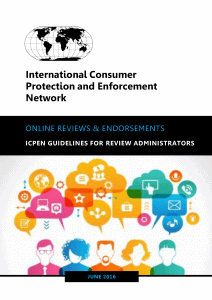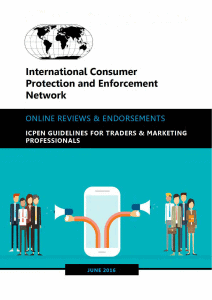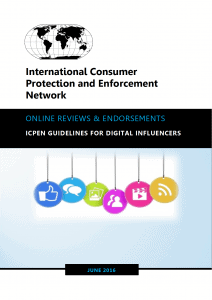Online Reviews & Endorsements Guidance Issued
The International Consumer Protection and Enforcement Network (ICPEN), a network of consumer protection authorities from nearly 60 countries, including the Competition Bureau of Canada, has published three sets of guidelines on online reviews and endorsements for:
- review administrators,
- traders and marketing professionals, and
- digital influencers.
The guidelines are timely, as the “digital economy”, particularly online representations that affect consumers, is an enforcement priority for the Competition Bureau.
ICPEN Guidelines for Review Administrators
The impact of online reviews and endorsements is increasing with the growth of the sharing economy, ICPEN notes. Buyers connect with sellers on platforms, and rely on user reviews because they lack familiarity with the sellers. Sellers, in turn, are relying more on user reviews instead of traditional advertising. This, ICPEN says, “amplifies the importance of ensuring that reviews on sharing economy platforms are genuine, commercial relationships are disclosed, and ratings systems and evaluation scales are used fairly.”
Review administrators are organisations that processes consumer reviews. ICPEN identifies three kinds of review administrators:
- Suppliers that obtain reviews about their own products
- Third parties that obtain reviews on behalf of suppliers
- Independent review platforms
ICPEN outlines three key principles for review administrators. They should be:
- be equal and fair in the collection of reviews
- be alert and proactive in the moderation of reviews
- be transparent in the publication of reviews.
ICPEN Guidelines for Traders & Marketing Professionals
Businesses can promote themselves through advertorials in online media, sponsoring bloggers, and brand ambassadors on social media, ICPEN notes. They can also respond to negative reviews on social media and review platforms. But, ICPEN notes, they must not act unfairly themselves, for example, by hiding advertising or blocking publication of genuine and lawful reviews.
“Traders” are businesses that promote their goods, services, or brands on review platforms, blogs, tweets, or other social media.
“Marketing professionals” are those who promote the goods, services, or brands of their clients on review platforms, blogs, tweets, or other social media.
Traders and marketing professionals should be guided by the
following key principles, ICPEN says:
- do not prevent consumers from seeing the whole picture of genuine, relevant and lawful reviews;
- do not write, commission or publish fake reviews;
- disclose paid-for content clearly and prominently; and
- disclose other commercial relationships where they may be relevant to the content.
One practice that has come under scrutiny by agencies is “astroturfing”, that is, the practice of procuring positive reviews of a product from employees or other non-arm’s length reviewers. In October 2015, the Bureau obtained a $1.25 million administrative monetary penalty from Bell Canada after Bell has encouraged its employees to post positive reviews of a free app designed to help customers manage their wireless accounts. (See Bell Called Out For Employee App Reviews.)
ICPEN Guidelines for Digital Influencers
The Guidelines for Digital Influencers seem to be targeted at concerns about so-called “native advertising”. Native advertising is advertising that looks like the content into which it is embedded, such as paid search results, or paid editorial content on a news site. Native advertising is a legitimate business practice, but it should be clear that the content has been paid for, ICPEN says.
ICPEN defines “digital influencers” very broadly, to anyone who posts online content, whether on their own website, a review platform, or social media. In other words, ICPEN includes all consumers who are online in the definition of “digital influencer”; it is not limited to people involved in native advertising.
Digital influencers should be guided by the following key principles, according to ICPEN:
- disclose, clearly and prominently, whether content has been paid for
- be open about other commercial relationships that might be relevant to the contents; and
- give genuine reviews on markets, businesses, goods or services.
The ICPEN guidelines in Canada
The ICPEN guidelines are not law in Canada; nor were they designed to provide guidance on complying with the deceptive marketing practices provisions of the Competition Act.
That being said, the ICPEN guidelines contain sensible advice that, in many cases, goes beyond the requirements of the Competition Act. Canadian businesses will be well advised to following these guidelines in order to ensure that their use of online reviews and endorsements does not attract unwelcome scrutiny from the Bureau.
















